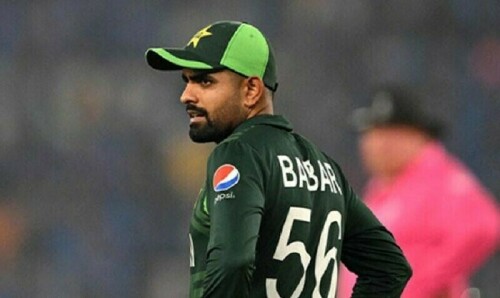KARACHI: Describing the International Cricket Council (ICC) ban on Saeed Ajmal as a massive loss for Pakistan cricket, national team head coach Waqar Younis said on Monday it was imperative for other bowlers to stand up and be counted.
In an exclusive interview with Dawn, the former national skipper, who formed one of the deadliest new-ball partnerships with Wasim Akram during the 1990s, admitted Pakistan will have to regroup as soon as possible to remain one of the major title contenders at the 2015 World Cup in Australia and New Zealand.
“I have to be honest in my opinion when I say that somehow or the other we must manage ourselves in the best way we possibly could. It’s [likely absence of Saeed Ajmal] is a huge setback, there’s no doubt about it since he was a captain’s dream because of his usefulness in powerplay overs. But I guess we’ve got to overcome it,” said Waqar as he watched a match in the ongoing T20 Cup here at the National Stadium.
“We have already expedited the search for possible replacements. Of course it won’t be easy [for us] to get a carbon copy substitute because Ajmal has been Pakistan’s main strike weapon in all forms for the past two to three years. Every team feared him and his record speaks for itself as a genuine match-winner who has been regarded among the best bowlers.
Coach satisfied with Pakistan’s pace combination
“Realistically speaking it’s a difficult time for Pakistan but I’m optimistic that we would be able to have others shouldering the responsibility. We have [leg-spinner] Yasir Shah as an option and there is Zulfiqar Babar who is an experienced bowler. But I must stress that guys like [Shahid] Afridi and [Mohammad] Hafeez have to take more of the responsibilities as frontline bowlers from now onwards,” he emphasised.
Waqar however lamented that no back-up was prepared for Ajmal. “We have obviously not done ourselves any favour by looking in the opposite direction when it was necessary to have back-up readily available. It’s a harsh lesson but nevertheless a lesson we should all learn.”
The head coach seemed satisfied with the fast bowling combination ahead of the World Cup, reckoning that Pakistan have a decent fast bowling attack to take advantage of the generally pace-friendly conditions in Australia and New Zealand.
“I think our bases are pretty good in that area. Mohammad Irfan, Junaid Khan and Wahab Riaz, for example, have the capacity to be useful in conditions suiting them. And then we have other bowlers who are proficient enough. Anwar Ali and Bilawal Bhatti would provide all-round options as well,” he observed.
“The pitches in those countries vary from venue to venue. The Australian ones generally have more bounce than those in New Zealand. At some places spinners do get purchase and we have to have our bases well covered.”
Commenting on Pakistan’s last series in Sri Lanka, Waqar said the tour had been a wake-up call for his team.
“It wasn’t good for us because nobody likes losing. I’m not offering excuses but it was tough for us because Sri Lanka had come into the series after playing regularly against England and South Africa.
“But we were clearly found wanting since the boys had no matches in the four months leading up to the tour. The conditioning camp was good but it was not the ideal preparation. It is always a big contrast when you aren’t playing competitive games for such a lengthy period because training is totally something else.”
Waqar, now in his second tenure as Pakistan coach, further emphasised time had come for the team to embrace a different mindset.
“Gone are the days when chasing 270 was hard. These days, particularly with changed rules, teams find totals of even 300 chaseable. To me, our mindset has got to change. The players have to be aggressive in their approach to compete against good sides on an equal footing.
“We can’t afford to relax as such. The senior guys have to guide the younger ones. The team management has felt that playing seven batsmen is ideal since there are occasions when the team requires an extra cushion. Fawad Alam and Sohaib Maqsood came to the rescue when defeat was looming in the first ODI [against Sri Lanka last month] because we had one extra batsman in the XI,” he commented.
“I also feel Sarfraz Ahmed deserves to be in there somewhere in the ODI team. He had a wonderful [Test] tour of Sri Lanka with the bat. I admire his daring attitude and someone like him should be part of the ODI team as well. Asad Shafiq is another player I really like because he has a cool head,” the 87-Test veteran underlined.
Waqar felt a huge pressure had been lifted from Misbah-ul-Haq’s back following the confirmation that the veteran Test and ODI captain would lead Pakistan at the World Cup.
“Misbah was under intense pressure prior to the announcement. Admittedly he didn’t have the best of tours in Sri Lanka. But I’m sure he is feeling much more relaxed these days and would focus on regaining his form for the Australia series, but he must change his approach to suit the team’s needs.
“I wish him the best of luck because he is an integral part of the team just like Younis Khan who could also be a key factor on bouncy tracks Down Under [at the World Cup].”
Waqar believes Pakistan supporters must back their team for the World Cup challenge.
“We must draw inspiration from past history. I missed out after getting injured just days before the 1992 World Cup started and yet we won the title because each one of us backed the team,” he recalled. “We need to have that sort of support to inspire our team no matter who you are.
“I know it is a huge task but I’m sure by the time World Cup starts we would be up and ready to mount our campaign in earnest for the trophy we all want to win again,” Waqar hoped. “After all we are part of a nation which has achieved laurels against heavy odds.”
Published in Dawn, September 23rd , 2014














































